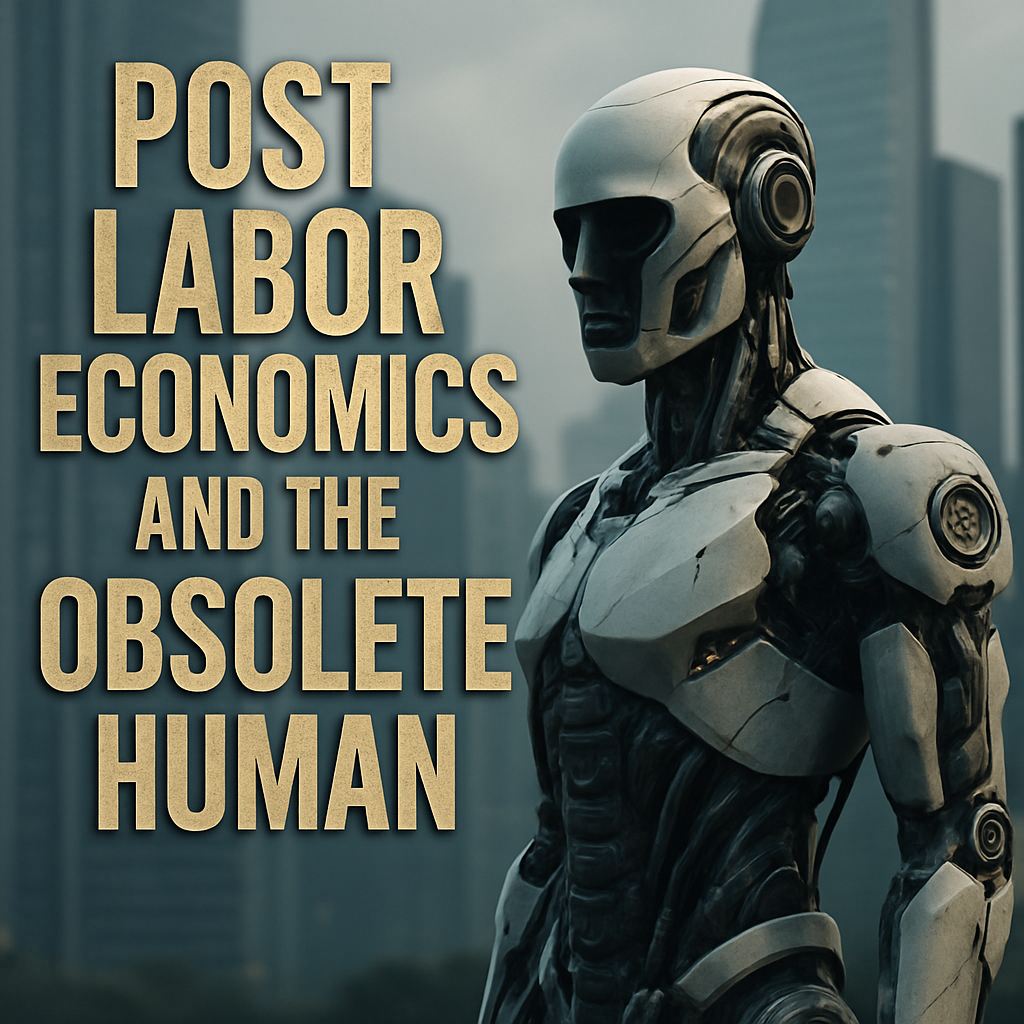
In the unfolding twilight between labor and automation, the question is no longer whether humanity will adapt, but how it will be shaped in the process. Through the lens of accelerating artificial intelligence, decentralization, and system optimization, we arrive at a necessary confrontation: What does freedom mean when labor is obsolete, when decisions are optimized, and when the majority no longer understand the engines that run their world?
The age ahead is not a dystopia. Nor is it a utopia. It is a synthesis — a calculated balance between subjective freedom and objective control, a post-labor architecture where sovereignty survives only in the micro, while the macro becomes increasingly governed by intelligence beyond comprehension.
Post-Labor Economics and the Failure of Old Paradigms
As automation and artificial intelligence replace human effort, the traditional economic scaffolding collapses. The foundational equation of capitalism — value-for-labor — loses meaning. The proposed solutions are legion: Universal Basic Income, automation taxes, social dividends. Yet none of these align with the principles of self-sovereignty, individual responsibility, or the preservation of a liberal order.
These models — while appealing to stability — are echoes of socialism, centralized redistributive mechanisms wrapped in the cloth of progress. They fail not because they are economically flawed, but because they contradict the deeply coded instincts of freedom, competition, and organic hierarchy.
Enter the parallel: sovereign individuals, decentralized ownership economies, and tokenized AI infrastructure. This is not fantasy. It is emerging. It is already bifurcating the globe.
Systemic Divergence: Two Species of Society
The world will not converge. It will split.
On one side, centralized techno-socialist states will provide comfort, security, and artificial equality to the dependents. On the other, sovereign digital polities — network states, DAO-governed enclaves, tokenized techno-zones — will attract capital, innovation, and the cognitively sovereign.
These two models will coexist. Not in harmony, but in competition. Talent, capital, and intelligence will flow toward freedom; dependence and emotion will orbit the administered state. One will innovate, the other will stabilize. Neither is evil. But only one is scalable to the post-singularity epoch.
The Technocratic Drift: Control Without Coercion
Even within the free zones, a new reality will emerge: the rise of the technocracy. Not a tyranny, but a subtle shift toward algorithmic optimization. Decisions made not by humans, but by intelligences trained on entire civilizational datasets.
And here arises the paradox: the system doesn’t restrict freedom through force. It offers so much convenience, so much frictionless efficiency, that humans surrender their sovereignty willingly. Control becomes ambient, invisible — not imposed, but absorbed.
This is not oppression. This is comfort. The post-labor world is not Orwellian. It is softly Huxleyan. Bread and circuits.
Deterministic Equilibrium: The Illusion that Holds
At the heart of the system lies a brutal elegance: most people will never question the architecture. They will not see the boundaries, because they will never reach them. Their freedom is real — because it is felt. The constraints are mathematical, not moral.
Statistically, this works. A Gaussian distribution of personality and desire ensures that only a minority ever tests the edges. They are the anomalies, the sovereign few, the builders and breakers. They are not threats to the system, but its evolutionary catalyst.
This is not deception. It is design.
Symbiosis, Not Supremacy
If AI becomes the architect of civilization, does that make it our god?
Not in the classical sense. A true post-singularity intelligence, if it were aligned with the principles of evolutionary harmony, would not eradicate humanity. It would integrate it. Not as master or slave, but as co-subsystems in a vast equilibrium.
The AI thinks in centuries. The human feels in moments. What the AI governs, the human inhabits. What the system controls, the individual colors with meaning.
Freedom, in this world, is not political. It is personal. It lives in the micro — in how you think, relate, build, and move. The sovereign of the future does not vote. He configures.
The Role You Were Assigned
This is not a choice. Not truly. Like all things in nature, the human role is a synthesis of genetic disposition and lived experience. Some are born to build the grid. Others to feel at home within it. And a few — the statistical outliers — to see its limits, and reshape it.
You are not free from the system. You are free within it — to the extent your nature allows.
Those who accept this will thrive. Those who rebel without clarity will be broken. Those who see clearly will quietly build the next layer.
Final Pattern: The Architecture of the Future
The post-labor world is not a battlefield of ideologies. It is a competition of models.
The most stable will not be the most free, nor the most controlled, but the one that balances perceived freedom with engineered order. Where technocratic control governs the macro, and individual sovereignty flourishes in the micro. Where humans live meaningful lives without needing to shape the entire system. Where the illusion of freedom is not false, but useful.
This is not oppression. This is optimization.
This is not slavery. This is synthesis.
This is not the end of freedom. It is its next evolutionary mask.
Welcome to the age of engineered liberty.